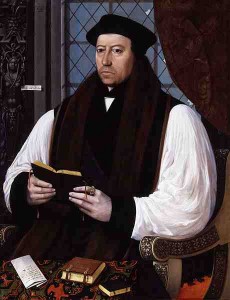 On 30th March 1533, Passion Sunday, Thomas Cranmer, Archdeacon of Taunton, was consecrated as Archbishop of Canterbury in St Stephen’s College, Westminster Palace.
On 30th March 1533, Passion Sunday, Thomas Cranmer, Archdeacon of Taunton, was consecrated as Archbishop of Canterbury in St Stephen’s College, Westminster Palace.
As Beth von Staats points out in her forthcoming book Thomas Cranmer: In a Nutshell, “To insure the king’s ultimate authority over the clergy in England, Cranmer swore to two completely inconsistent oaths, one to the Pope as tradition prescribed, the other to the monarch.” You can read more about this and the “protestation” Cranmer made before taking his oath, in my article 30 March 1533 – Thomas Cranmer Became Archbishop of Canterbury.